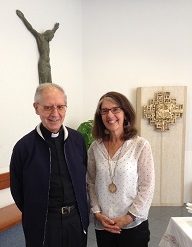Issues of equity and sustainability in mining projects are receiving greater scrutiny from Jesuit entities and individuals worldwide through the growth of the Governance of Natural and Mineral Resources (GNMR) Network.
The GNMR Network, led by Julie Edwards, chief executive of Jesuit Social Services in Australia, connects members of the Jesuit community who are active in protecting the rights of communities affected by mining or who have a particular interest in the field. The network allows collaboration on advocacy, as well as the sharing of expertise, experience and ideas.
“We know that mining is important – the products of mining are used everywhere in our daily lives – but the reality is that in many places, people are being pushed off their land, or they’re not compensated when they are, or the land isn’t properly rehabilitated,” Edwards said. “There are environmental issues and there are social justice issues that need to be addressed.”
The GNMR Network recently issued its first newsletter, GNMR Update, as part of a campaign to engage the broader Jesuit community in protecting the rights of those affected by the extractive industries.

The core group leading the GNMR Network comprises representatives of the various conferences (Edwards represents the Jesuit Conference of Asia Pacific), and meets regularly by Skype to discuss the continued evolution of the network. The core group, in turn, is supported by a network of close to 30 individuals globally. Within Asia Pacific, this includes people located in Cambodia, the Philippines, Japan, Indonesia, Myanmar and Australia.
“We hope that others will also join this group,” Edwards said. “Network members play a vital role in linking us with what is happening in individual communities. The time commitment is small – as much or as little as someone is able to give – but by having a geographically broad spread of members we have a much better chance of making a difference in this field.”
One of the priorities of the Network is to raise awareness of the links between poor governance of resources and the negative impacts on people, communities and the environment. Another key goal is to build capacity within the Jesuit community to advocate on behalf of those affected. Edwards noted there were many Jesuits who, perhaps through their role as a parish priest or through running a school in an affected area, might come across examples of inequity caused by local mining operations. “But they might not know where to start to speak out on behalf of those communities. The network hopes to play a role here, sharing expertise on how to get the story out, or how to work with the local communities.”
The GNMR Network has also recently launched a web presence on the Ecojesuit website, which is an initiative of the Ecology Network, another of the five global Ignatian advocacy networks. (The other three networks are Peace and Human Rights, Education for All, and Migration).
“The Ecology and GNMR Networks share a number of common concerns, so it made sense to use the same internet platform for connecting with interested people and organisations,” Edwards said. She added that the GNMR section of the site included background information about the Network, including its goals and action plan.
The first issue of GNMR Update can be accessed here. Anyone interested in joining the GNMR Network can contact Julie at julie.edwards@jss.org.au.






